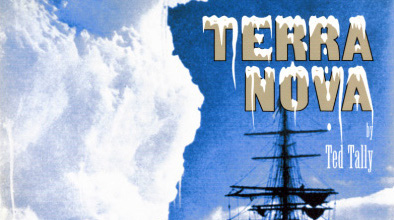In the winter of 1911-12, five Englishmen and five Norwegians raced each other to the bottom of the Earth. Only the Norwegians returned. Terra Nova is the story of Captain Scott's expedition to the South Pole. The discovery that Amundsen has preceded him, the bravery and sufferings of his team, the self-sacrifice of Captain Oates and the final tragedy, are recounted in a mixture of fantasy and realism which underlines both the human and the epic qualities of the adventure.
Terra Nova premiered at the Yale Rep in 1977 and its 1984 NYC production earned the writer an OBIE Award. The name is taken from the title of Captain Robert Scott's ill-fated early 20th century, scientific expedition to the South Pole, whose name itself was taken from the whaling ship on which they travelled.
Playwright, Ted Tally is perhaps best known for winning the 1992 OSCAR for Best Adapted Screen play of The Silence of the Lambs.
'Terra Nova' is the story of that fatal expedition, and of Scott's the discovery that the Norwegian explorer Amundsen had beaten him to the Pole. It opens and closes with Scott writing the final entries in the journal from which all the details of his last weeks are known. The bravery and suffering of his team, climaxing in the famous self-sacrifice of Captain Oates and the final tragedy are recounted in a mixture of fantasy and realism. This is achieved by the conjured presence of Scott's wife, Kathleen, and, - in a variety of guises - of Amundsen.
The play is drawn from the journals and letters found on the frozen body of Captain Scott. Refusing the use of sled dogs as unsporting, Scott and his team struggle to drag their heavy gear across a frozen wasteland, only to find that Amundsen has preceded them to their goal. The play is also a study of British pride and upper-class resolve, Scott's aristocratic sense of destiny and command, and his young bride's ability to understand her husband's compulsive drive while failing to accept his motivations. But it is in the tragic trip back, as the members of the expedition die one by one, that the play reaches its dramatic conclusion, capturing with chilling intensity the awesome bravery of men who must accept the bitter knowledge that suffering and death will be the only reward for their heroism.
Terra Nova premiered at the Yale Rep in 1977 and its 1984 NYC production earned the writer an OBIE Award. The name is taken from the title of Captain Robert Scott's ill-fated early 20th century, scientific expedition to the South Pole, whose name itself was taken from the whaling ship on which they travelled.
Playwright, Ted Tally is perhaps best known for winning the 1992 OSCAR for Best Adapted Screen play of The Silence of the Lambs.
'Terra Nova' is the story of that fatal expedition, and of Scott's the discovery that the Norwegian explorer Amundsen had beaten him to the Pole. It opens and closes with Scott writing the final entries in the journal from which all the details of his last weeks are known. The bravery and suffering of his team, climaxing in the famous self-sacrifice of Captain Oates and the final tragedy are recounted in a mixture of fantasy and realism. This is achieved by the conjured presence of Scott's wife, Kathleen, and, - in a variety of guises - of Amundsen.
The play is drawn from the journals and letters found on the frozen body of Captain Scott. Refusing the use of sled dogs as unsporting, Scott and his team struggle to drag their heavy gear across a frozen wasteland, only to find that Amundsen has preceded them to their goal. The play is also a study of British pride and upper-class resolve, Scott's aristocratic sense of destiny and command, and his young bride's ability to understand her husband's compulsive drive while failing to accept his motivations. But it is in the tragic trip back, as the members of the expedition die one by one, that the play reaches its dramatic conclusion, capturing with chilling intensity the awesome bravery of men who must accept the bitter knowledge that suffering and death will be the only reward for their heroism.
Production Team
DIRECTOR:
Deborah Burke
Producer:
Chris Cluett
SM:
Liz Allen
Cast
CAPTAIN ROBERT SCOTT:
Matthew Bogen
ROALD AMUNDSEN:
Matt Regney
KATHLEEN SCOTT:
Amber Skye Noyes
CAPTAIN LAWRENCE "Titus" OATES:
Billy Anderson
DR. EDWARD WILSON:
Daniel Basiletti
LIEUTENANT HENRY "Birdie" BOWERS:
Chris Cluett
OFFICER EDGAR "Taffy" EVANS:
Dan Murphy

